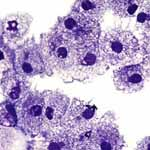
The science of endocrine disruptors is still being written, but it is clear these chemicals – more and more present in our daily environment – may have serious consequences. The Heinz Center investigates the relationship between these chemicals and breast cancer.
Current efforts on this deadly disease focus, critically, on detection, treatment, and cure. As we learn more about environmental factors, there is a growing consensus that we need an equal focus on prevention.
Endocrine Disruptors
 In recent years, the Center has developed a talent pool of expert scientists on endocrine-disrupting chemicals, i.e., artificial substances that can impinge on normal human hormone functions. Counter-intuitively – at least to those raised on the maxim that “the dose makes the poison” – it appears that endocrine disrupters can work their greatest harm when introduced in small quantities at crucial moments for hormone function; pregnancy, for example. Heinz Center chairman John Peterson Myers is an internationally recognized scientific authority on endocrine functions, and helped organize a groundbreaking Horizons@Heinz session on the subject featuring notable scientists – inside and outside of government – summarizing the latest research about the effects of environmental chemicals on hormone functions. MORE>
In recent years, the Center has developed a talent pool of expert scientists on endocrine-disrupting chemicals, i.e., artificial substances that can impinge on normal human hormone functions. Counter-intuitively – at least to those raised on the maxim that “the dose makes the poison” – it appears that endocrine disrupters can work their greatest harm when introduced in small quantities at crucial moments for hormone function; pregnancy, for example. Heinz Center chairman John Peterson Myers is an internationally recognized scientific authority on endocrine functions, and helped organize a groundbreaking Horizons@Heinz session on the subject featuring notable scientists – inside and outside of government – summarizing the latest research about the effects of environmental chemicals on hormone functions. MORE>
Breast Cancer & the Environment
 The Heinz Center is launching a bipartisan effort on the causes of breast cancer. The Initiative will draw its members from scientists and physicians as well as officeholders and administrators from both major political parties. This effort will review the scientific literature that looks at the causation of breast cancer rather than its detection or treatment and weighs the merits of a preventative approach. MORE>
The Heinz Center is launching a bipartisan effort on the causes of breast cancer. The Initiative will draw its members from scientists and physicians as well as officeholders and administrators from both major political parties. This effort will review the scientific literature that looks at the causation of breast cancer rather than its detection or treatment and weighs the merits of a preventative approach. MORE>
